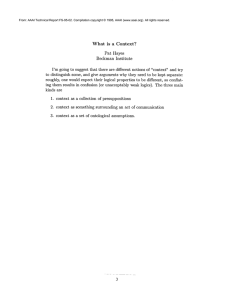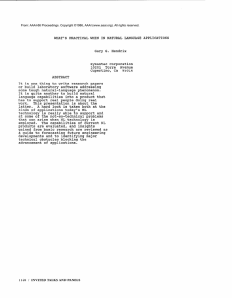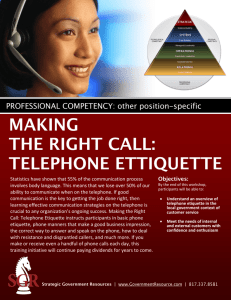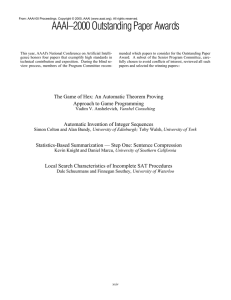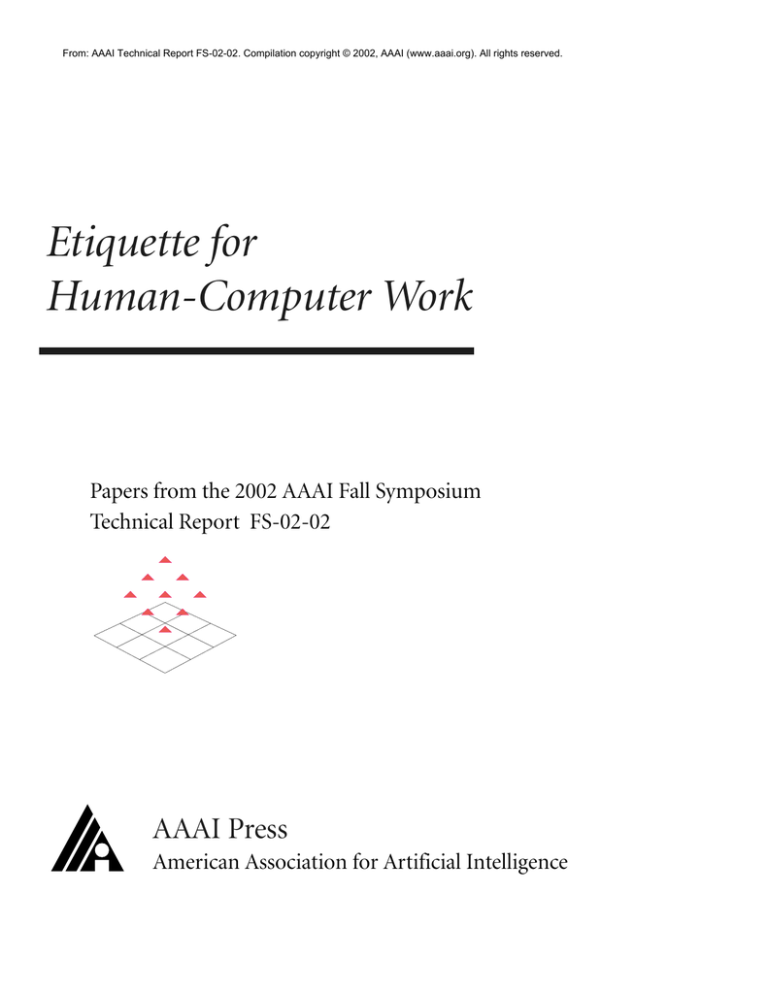
From: AAAI Technical Report FS-02-02. Compilation copyright © 2002, AAAI (www.aaai.org). All rights reserved.
Etiquette for
Human-Computer Work
Papers from the 2002 AAAI Fall Symposium
Technical Report FS-02-02
AAAI Press
American Association for Artificial Intelligence
Etiquette for
Human-Computer Work
Papers from the 2002 AAAI Fall Symposium
Christopher Miller, Chair
November 15–17, North Falmouth, Massachusetts
Technical Report FS-02-02
AAAI Press
Menlo Park, California
Copyright © 2002, AAAI Press
The American Association for Artificial Intelligence
445 Burgess Drive
Menlo Park, California 94025
Technical Report FS-02-02
ISBN 1-57735-173-8
Manufactured in the United States of America
Organizing Committee
Christopher Miller (Chair), Smart Information Flow Technologies
Timothy Bickmore, MIT Media Lab
Clifford Nass, Stanford University
Raja Parasuraman, The Catholic University of America
Contents
Definitions and Dimensions of Etiquette / 1
Christopher A. Miller
Trust and Communication in Complex, Safety Critical Systems / 8
Raja Parasuraman
When Etiquette Really Matters: Relational Agents and Behavior Change / 9
Timothy Bickmore
Understanding and Decreasing Aversive Behavior in Online Social Contexts / 11
John P. Davis
Impact of Roles on Participation and Task Performance / 14
Susan Hahn, Michael Lewis, and Terri L. Lenox
Trust in Computer Technology and the Implications for Design and Evaluation / 20
John D. Lee and Katrina A. See
Making Pedagogical Agents More Socially Intelligent / 27
Lewis Johnson
Specifying Organizational Policies and Individual Preferences
for Human-Software Interaction / 32
Debra Schreckenghost, Cheryl Martin, and Carroll Thronesbery
Polite Computing: Software that Respects the User / 40
Brian Whitworth
Etiquette in Human Computer Interactions:
What Does it Mean for a Computer to be Polite?
Or Who Needs Polite Computers Anyway? / 47
Caroline Hayes, Amit Pande, and Chris Miller
Collective Mistrust of Alarms / 52
James P. Bliss, Susan Sidone, and Holly Mason
Etiquette within and between Large Human-Robot Teams / 57
Christopher L. Johnson
Computer Teammates: Should They Read Your Mind? / 61
Mark W. Scerbo
A Framework for Designing Etiquette for Educational Technology / 68
Punyashloke Mishra and Kathryn Hershey
Good Computational Manners: Mixed-Initiative Dialog
in Conversational Agents / 71
Max Louwerse, Art Graesser, Andrew Olney, and the Tutoring Research Group
Etiquette and Efficacy in Animated Pedagogical Agents:
The Role of Stereotypes / 77
Kristen N. Moreno, Natalie K. Person, Amy B. Adcock, Richard N. Van Eck, G. Tanner Jackson, and Johanna C. Marineau
Personal Data for Personal Use: Case Studies in User Modeling for Context-Aware Computing / 81
Andrea Lockerd and Ernesto Arroyo
Experiences with Civility and the Role of a Social Contract in
Virtual Communities: A Communitas Model / 85
Barry Kort, Rob Reilly, and Nancy Williams
Traps, Pitfalls, Swindles, Lies, Doubts and Suspicions in Human-Computer Interaction:
A Counter-Case for the Study of Good Etiquette / 87
Jack L. Edwards, Greg Scott, Sharon McFadden, and Keith C. Hendy

